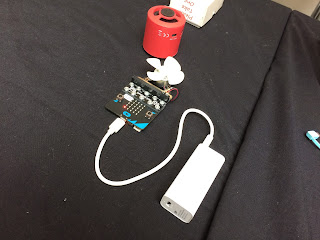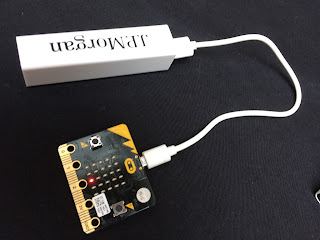What a great Jam.
For the 15th Egham Raspberry Jam a few things were different.
It was the first Egham Jam where workshops were conducted
To increase local reach the Jam was promoted on a number of local Facebook pages
Again, to increase exposure flyers were sent to the 2 councils that overlap the area where people usually come from for the Jam.
Workshops.
From the feedback the workshops were a great success.
We ran Physical Computing with Scratch and Physical Computing with GPIOZero.
The GPIOZero workshop was based on the worksheet provided by the Raspberry Pi Foundation and the Scratch workshop was a reworking of the GPIOZero workshop but using Scratch instead of Python.
Both were fully booked and for the Scratch one there were people standing at the back listening in and learning even thought they did not have the opportunity to follow along with a Raspberry Pi.
We wee very lucky to have a nice big room with a large screen at the front for the Workshop leaders to show the instructions and sample code on.
Remove before setup. This room is usually set up for meetings or workshops and so it was great to arrive and see it empty so we could set it up as we wished.
 |
| Room before set up - nice size |
Physical Computing with Scratch workshop lead by
Matt Sendorek with lots of people sitting and standing at the back.
Scratch Physical Computer Worksheet is available to download
 |
| Scratch Workshop was busy |
Yes, that's a lot of code and very successful code. You can see the green LED is on.
First steps in physical computing.
 |
| We have working code and flashing LEDs |
There was a real mix of ages. Everything from 8 years old to some that were definitely the wrong side of 50.
 |
| All ages taking part |
The Python/GPIOZero workshop lead by
Andy Balaam was also busy. As mentioned the worksheets were supplied by the Raspberry Pi Foundation and you can
download them from their website.
More successful code. LEDs are on.
 |
| Loving the look of concentration |
Some adapted their code so it worked for only super sonic vehicles with amazing brakes.
 |
| Have a funny feeling these traffic lights might be a little too fast for traffic |
While all this was going on the show and tell area was kept busy with a wide range of projects to inspire and education people on what was possible.
How about a musical knitted octopus that uses Scratch and a
Makey Makey to allow you to play it like a musical instrument. Makey Makey is available in Maplin if you're looking for a UK based shop.
 |
| Musical Octopus |
Chertsey Radio Club brought along some of their equipment to teach people about radio transmitters and receivers
 |
| Chertsey Radio Club transmitter |
 |
| Chertsey Radio Club were beaming images across the room wirelessly |
Google AIY robot arm that can be controlled by voice and also do image recognition with the assistant of Google service.
This was a fun one to put different objects in front of and see what Google thought it was. The brand logos were very recognisable while the tennis ball confused it a bit
 |
| Voice controlled robot arm with image recognition |
If you've never been I recommend you go to PiWars in Cambridge. It's a brilliant robot competition where the design of the hardware, software and the creativity of the robots is all taken into account for the scoring. This robot has interchangeable fronts depending on the challenge.
My favourite is the gold playing mole.
 |
| Main robot chassis with one of the animatronic fittings |
 |
| Golf playing mole |
 |
| Bare robot doing line following |
Thomas Stratford was showing a 30+ year old VIC-20 programmed in BASIC with lots of poke commands controlling LEDs. The VIC-20 has been a labour of love for Thomas. Firstly getting the case and parts clean again after they had discoloured with age. Then actually getting them fixed. And finally learning to program it and interface with it to control electronics.
It was great to see a VIC-20 next to the Raspberry Pi. The Pi costs about £50 to buy with all the bits. Back in the day a VIC-20 would have costed £300 and that's before taking into account inflation.
For your £300 you got an 8bit 1MHz processor, with 3.5K RAM and no storage.
The Raspberry Pi for £50 gives you a 1.2GHz Quad Core 64 bit processor, with 1GB RAM and depending on the microSD you provide anywhere from 8GB to 128GB of storage.
How technology has moved on and improved.
Still the Physical Computing Workshop could have been run with a VIC-20 and we could have thought people how to use BASIC and specifically the poke command to turn on and off LEDs.
So, another success Egham Raspberry Jam.
Over 100 registered initially. Some cancelled before the date to free up their tickets, so the event finished with 95 register. If this 78 attended. This is a great turn out for a free event as people don't seem to be as bought in if the event didn't cost them money.
It also seems the local promotion made a big difference. A lot of new faces and people mentioning they heard of the Jam from from Facebook.
No one mentioned the flyers and I didn't get a chance to revisit the locations where the flyers would go up to see if they were posted. But I'll definitely do that again.
One person said they heard about the Jam from the flyer handed in at the Staines branch of Maplin. Looking like old school high street promotion still has it's place.
About 4:00pm people started heading away and all the displays were packed up and the room for the workshops was put back the way it was before.
It's like we were never there except that nearly 80 people got to experience the pleasure of being creative and learning how to make things with computers. Maybe some of them will come to the next Egham Raspberry jam with a project they made and not just to see what others have done.






































































